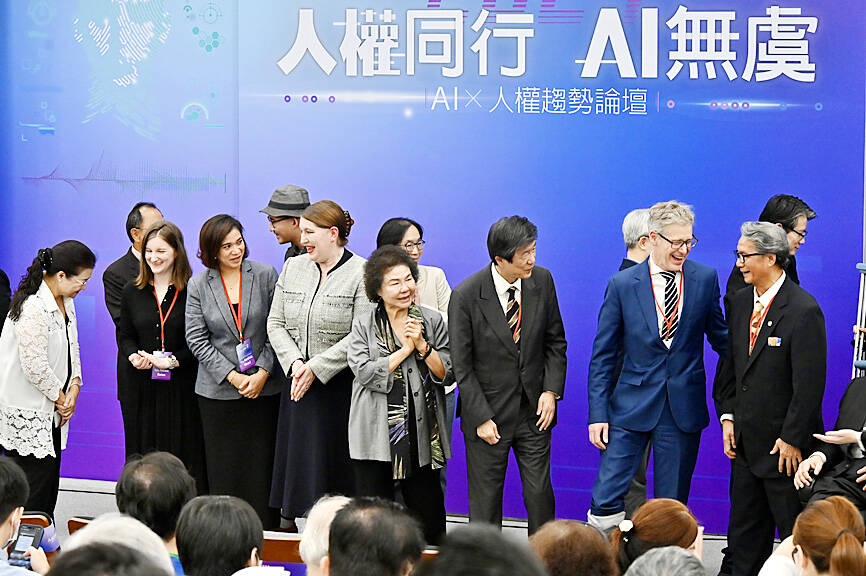PRIVACY CONCERNS:
A study by the UN showed 75 percent of respondents revealed personal information to AI chatbots and they are worried about doing so
-
By Jonathan Chin /
Staff writer, with CNA
Taiwan must be ready for the dangers posed by generative artificial intelligence (AI) to human rights and freedoms, National Human Rights Commission Chairwoman Chen Chu (陳菊) said yesterday.
The commission considers AI-related challenges to human rights a matter of priority, while giving due credit to the convenience and productivity benefits stemming from the technology, she told a conference in Taipei on human rights.
Citing the Office of the UN High Commissioner for Human Rights, Chen said that algorithmic technology has been linked to certain adverse effects on rights and disadvantaged groups.
Photo: George Tsorng, Taipei Times
AI-generated disinformation undermines the foundations of speech freedom by attacking the human capacity to think freely, conceptualize unique ideas and hold freely formed personal beliefs, Chen said.
Disinformation’s spread is especially pernicious to the ability of free people to make considered judgements on public affairs, she said.
AI is also accelerating automation in sectors that traditionally employ disadvantaged groups, worsening poverty and social inequality, Chen said.
Algorithms have extensively been used to generate images harmful to women and children, including materials portraying sexual violence and deepfakes created without the consent of the subjects they depicted, she said.
Children, lacking media literacy to discern bot-generated content, have become more vulnerable to negative influence than before due to AI technology, she said.
Taiwan has to recognize the human rights threat posed by generative AI and take steps to prevent abuses, she said.
She said a recent study conducted by the UN commission showed that 75 percent of respondents revealed personal information while interacting with chatbots and worry that these interactions compromised their privacy.
The survey also showed that 61.7 percent of respondents reported experiencing erroneous, inappropriate or discriminatory content created by an AI tool, she said.
About 90 percent of respondents agreed that more conversations should be included in the development of generative AI to protect the representation of disadvantaged minority groups, she said.
In addition, about 80 percent of respondents agreed that governments should regulate or supervise the research and development of the technology to guard against potential harm to human rights, she said.
As a free and democratic nation, Taiwan must ensure its generative AI technology would respect the values of human dignity and free development of personality, and not be applied in ways that impede freedom, Chen said.
Comments will be moderated. Keep comments relevant to the article. Remarks containing abusive and obscene language, personal attacks of any kind or promotion will be removed and the user banned. Final decision will be at the discretion of the Taipei Times.




